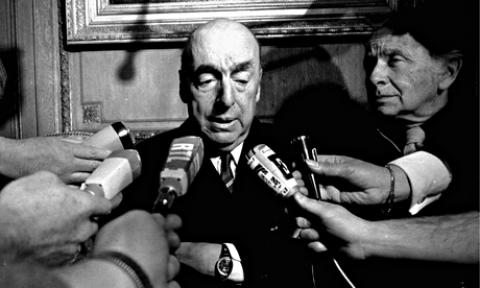More than 20 unpublished poems by Pablo Neruda – works of "extraordinary quality" according to his publisher – have been unearthed among the papers of the late Nobel laureate in his native Chile.
Neruda's Spanish publisher Seix Barral called the discovery "a literary event of universal importance", and "the biggest find in Spanish literature in recent years". The poems, which range from love poetry to poems dealing with everyday objects, were written by the mature Neruda, said the publisher, after 1950's Canto General. They are, said the poet and academic Pere Gimferrer, who is involved with the publication of the poems, as full of "the imaginative power, the overflowing expressive fullness and the same gift, the erotic or loving passion" as Neruda's best works.
An extract runs: "Reposa tu pura cadera y el arco de flechas mojadas / extiende en la noche los pétalos que forman tu forma", which translates literally as "Rest your pure hip and the bow of wet arrows / Extend into the night the petals which make up your form."
Gimferrer, whose expert opinion confirmed that Neruda was indeed the author of the poems, compared the previously unknown works to "the Neruda of the poems of Odas elementales, La Barcarola, Memorial de Isla Negra and even the Neruda of Estravagario".
Adam Feinstein, author of the acclaimed biography Pablo Neruda: A Passion for Life, called the lines "remarkable", and said that it appears the newly-found poems "are full of Neruda's richly imaginative use of language and imagery", some of them "apparently passionate love poems while others are songs to simple objects, along the lines of Neruda's Odes".
"This is an enormously exciting discovery," Feinstein told the Guardian. "In his lifetime, Neruda used to joke that one day they would go as far as to publish his socks. Now they have uncovered a whole new batch of his poems which lay unsuspected in a drawer. As Neruda's biographer, I am really looking forward to reading the poems and expect to find further examples of his lyrical genius."
The poems were found, said Seix Barral, in boxes of the poet's manuscripts kept at the Pablo Neruda foundation in Chile, and they will be published in late 2014 in Latin America and early 2015 in Spain.
Neruda, called "the greatest poet of the 20th century in any language" by Gabriel García Márquez, won the Nobel prize in 1971 for "for a poetry that with the action of an elemental force brings alive a continent's destiny and dreams", from Twenty Love Poems to a Song of Despair. The news of the discovery in Chile comes as a Chilean judge orders new tests on Neruda's body, which was exhumed in Isla Negra last April to determine whether or not he had been murdered by the Pinochet regime.
Neruda died on 23 September 1973, 12 days after Pinochet's military coup. The poet had been suffering from prostate cancer, but his driver Manuel Araya has claimed his death was "accelerated" by Pinochet's junta via an injection in his stomach, as the regime was fearful that, if Neruda fled into exile from Chile, as was his plan, he would become a dangerous voice of opposition.
It was announced in November 2013 that no poison had been found in Neruda's remains, but members of the poet's family contested the toxicology reports, and now the Associated Press has reported that judge Mario Carroza, in charge of the case, has requested more tests for further substances not found during the first investigations. "We continue to work to determine the exact cause of death of the poet," the medical legal service said in a brief statement quoted by the AP.
Feinstein expressed the hope that the new tests "produce some definitive answers one way or the other, although this may prove extremely difficult, given that Neruda died 41 years ago".
"Neruda's own family members are divided on the need for an examination of the poet's remains," said the biographer. "Some feel that the official cause of death, by cancer, should be accepted while others insist that the investigation into allegations of possible poisoning must continue."


Spread the word